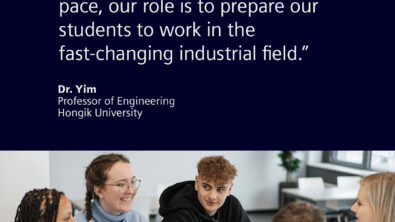New Courses From Siemens Available via Coursera

With the rapid change and expansion of digital tools, it is imperative for students, educators, and professionals to continue their education. Online courses bring value to universities and the workforce due to the flexibility of the course format and wide variety of topics available. Siemens strives to provide access to educational content and does so via Coursera. Siemens is now offering two new courses through Coursera, Introduction to Model-Based Systems Engineering and Applied Computational Fluid Dynamics.
All Siemens courses offered through Coursera are available free of charge for students, educators, or anyone interested in the material. With flexible deadlines and 100% online content, you can learn the material at your own pace, on your own schedule, all on your personal device. Upon completion of the course, you will have the opportunity to download a shareable certificate for an additional charge.
Introduction to Model-Based Systems Engineering (MBSE) Course
Course Breakdown: Strengthen your knowledge of Model-Based Systems Engineering (MBSE), and discover an approach that organizations, companies, and governments are using to manage ever-changing demands. In this course, you will learn more about systems thinking, architecture, and models. You will examine the key benefits of MBSE. Through an in-depth look at MBSE as a solution, you will examine SysML methodologies and languages. No degree is required. This course is primarily for professionals, college students, and advanced high school students who are interested in gaining introductory knowledge of MBSE software and principles.

This course represents a foundational introduction to MBSE, appropriate for learners with a basic knowledge of general engineering concepts and an interest in digital manufacturing and design. To succeed in this course, learners should bring their curiosity about how new developments in technology are shaping the way businesses and entire industries operate. This course has no formal prerequisites.
Introduction to MBSE is a beginner-level course that will take approximately 16 hours to complete. The ultimate goal of this course is to help concepts come alive using definitions and real-life examples through hands-on Coursera videos. Enrollment in this course comes with access to a Siemens learning community to answer questions and lead discussion.
Applied Computational Fluid Dynamics Course
Course Breakdown: This course is perfect for those looking to explore applied computational fluid dynamics (CFD) using the Simcenter STAR-CCM+ software or another CFD tool. This course can be a first step in improving job performance and furthering your career or educational trajectory.
Introduction to Applied CFD can be used to help you use the knowledge of flow physics and computational fluid dynamics to obtain quality solutions of flow and heat transfer problems most efficiently. This course is not about instructions on how to use a particular software, as Simcenter STAR-CCM+ was used exclusively for all simulations presented in this course. Still, the learning outcomes would be the same if another public or commercial software were used, as long as it has the same capabilities.

This course is taught by Professor Milovan Peric, Faculty of Engineering at the University of Duisburg-Essen. It is perfect for those who are looking to complement current education or refresh knowledge. This is an intermediate-level course that takes approximately 31 hours to complete.
Where To Go From Here
With free enrollment in both of these courses, participants can broaden their knowledge of MDSE and CFD. Check out the courses on Coursera here (MDSE) and here (CFD).
Plus check out our other open learning offerings:
- Digital Technologies and the Future of Manufacturing, University of Michigan
- People, Technology and the Future of Mobility, University of Michigan
- Digital Design, Harvey Mudd College
- Computer Architecture, Harvey Mudd College
The Siemens Academic partner grant supports faculty members who are interested in gaining access to this curriculum to support classroom instruction and real-world competitions. Finally, take a look at how Siemens collaborates with educators and students around the world in the Academic and Startups blog and Innovation in the Classroom podcast.


